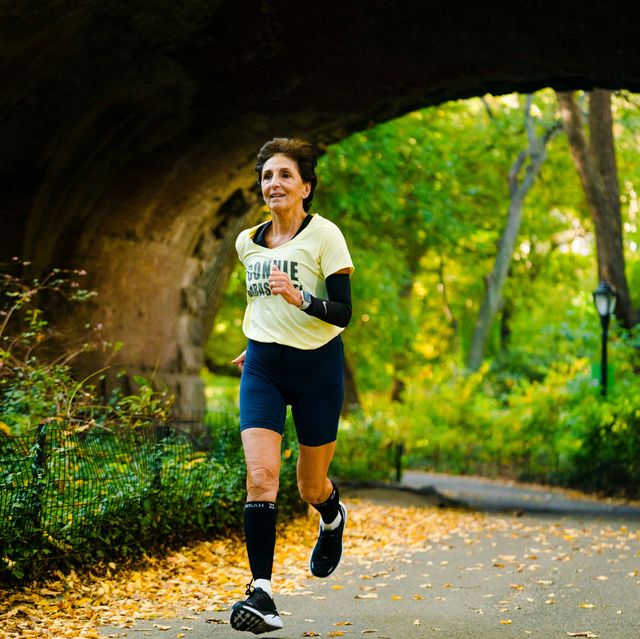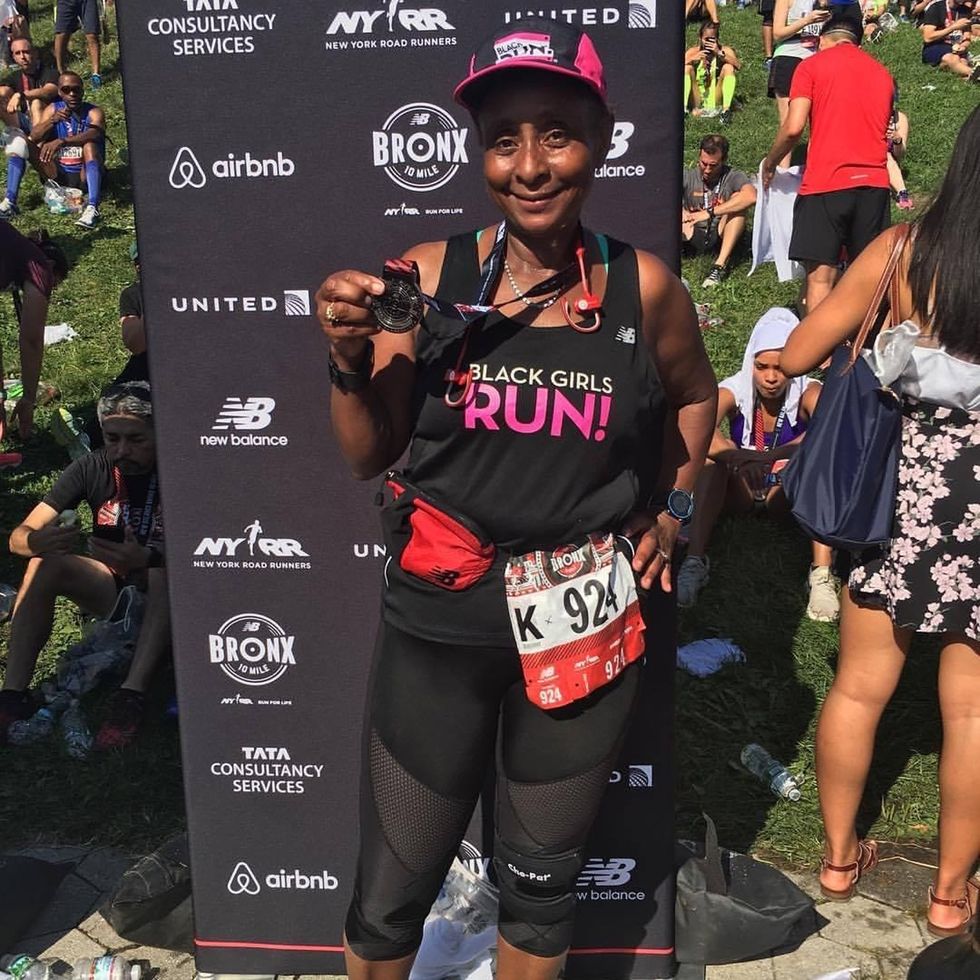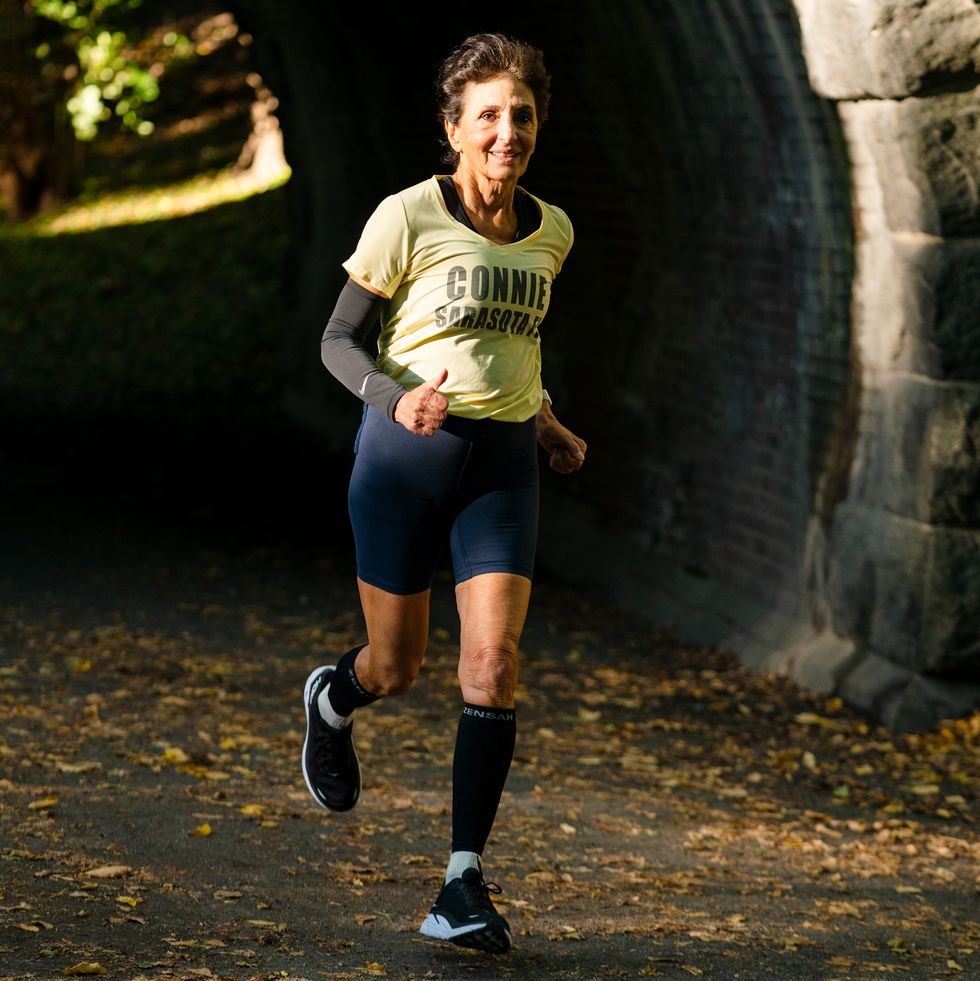These runners prove there’s no age limit to clocking fast kilometres and conquering marathons.

Connie Brown
Despite what some people think, you can start running at any age. In fact, more runners than ever are lacing up in their golden years. According to a survey, from 2015 to 2022, the number of participants with Running USA aged 55 to 65, increased from 10.8 to 16 percent. And runners 65 and older increased from 2.6 to 9 percent in that timeframe.
“I absolutely love the fact that at my age, I am still running and still able to do my training program,” Connie Brown, 80, a real estate broker in Sarasota, Florida, tells Runner’s World. “I enjoy running by myself while listening to a good book. I love running shorter races listening to country music and I love the socialization of running, talking and sharing with friends on a level that is closer than most people would guess. My running friends are some of my very closest friends.”
Running after 50 may require some adjustments in your schedule, like more rest days for example, but that will only help you maintain longevity in the sport. By simply moving more, you’re already ahead on enhancing your health and fitness and lengthening your life, considering research says those who regularly exercise live longer than their sedentary counterparts.
“While running in older years comes with new challenges—like changes in training, injury risk, and pace—runners are proving it can be done in a healthy and sustainable way,” adds Charlene Hubbard, 59, a flexologist at StretchLab from Beaverton, Oregon.
To help you find the habits that work best for you to stick to running well into your later years, we turned to runners over 50 who have done just that. Steal their tips for staying active—no matter your age.
1. Put Cross Training on Your Schedule
Muscle mass and strength naturally decrease with age, which is why it’s more important than ever to implement cross–training into your running routine.
“I do workouts to maintain muscular balance and strength, and yoga and stretching to maintain flexibility and balance. These have been crucial for running as I age,” says Hubbard.
Chris Christenberry, 62, a healthcare executive in Tampa, Florida, agrees, saying he turns to cycling, swimming, and strength training more often these days.
By swapping some of your running days for cross-training activities, you can still maintain a high level of physical activity, but without the same repetitive movement. “As I have gotten older, I have paid more attention to moderation in what I do,” says Brown. “In my early years, I ran six days a week and up to four or five marathons a year. Now I run three days a week, one marathon a year (occasionally two), and do a lot more cross training by participating in other sports such as biking, swimming, tennis, and pickleball.”
2. Remember Your “Why”
Maintaining a reason to get out and run is just as important for older runners as it is for runners of any age.
“I always remember my ‘why’, which motivates me to do some type of movement—even on the days that I lack motivation,” Gisela Perez, 70, a run coach from Bronx, New York, tells Runner’s World. “As an older adult, my ‘why’ is to maintain health and mental well-being through movement.”
 Courtesy Gisela Perez
Courtesy Gisela Perez
3. Focus on Warmups and Recovery
To prevent injury and help you feel good during your runs, make time to prepare your body for the work ahead and to have downtime. Giving your mind and muscles adequate rest are essential for older runners.
“Another challenge that I face as an older adult runner is that nowadays it takes me longer to get out of the house to go for a run because my body needs a longer warmup than it did when I was younger,” says Perez. “I now give myself extra time to warmup before starting my runs. I also need more recovery time after a long run: When I was younger I could run 16 kilometres and go out the next day and do another run. Nowadays, I need a recovery day or two after a long run.”
If you’re not feeling great at the start of most of your runs or feel super tired the day after a run, take those as signs that you need less intensity. You can still move your body in other ways (say, via yoga) but you may benefit from an added rest day or even a longer walking warmup or cooldown.
4. Know When to Back Off
“I have been blessed with good genes plus a mindset that has helped me to listen to my body, push it as far as it will go and know when to back off before causing serious injury,” says Brown. “When I run longer distances, I do the Galloway interval method where I walk/run, too.”
Perez agrees: “What has kept me strong all these years and helps maintain longevity is listening to the signals that my body sends me and knowing when I need to rest.”
5. Check Your Ego
Don’t let your ego get the best of you as an older runner. Have gratitude for what your body can do, rather than what it can’t.
“As an older runner, ego is a challenge. You remember how fast you used to be and that it takes so much more work to maintain what used to come easy,” says Hubbard. “However, I do believe that with age also comes the ability to have patience and grace with yourself. I’ve learned to enjoy the fact that I’m still out there doing it, rather than how fast I can do it.”
Brown agrees that comparing the runner he is now to the runner he used to be can test his motivation sometimes. But then he turns to gratitude. “The memories of my faster times confound me. I sometimes think I should still be able to run those paces. My effort seems the same but my results are much slower,” says Brown. “Whenever I feel nostalgic about how much [faster I used to be], I remind myself how lucky I am that I am still out there on the roads and trails enjoying what I love. I am filled with gratitude that I can still go out, put one foot in front of the other and keep moving forward.”
 Connie Brown
Connie Brown
Christenberry says that he also focuses on his participation rather than pace. “I think mindset is important—being satisfied with the participation and acknowledging that it is normal to get slower. It is more important to be injury-free and rested,” he says. “Celebrate the past, but embrace your ability to still run.”
6. Stretch and Stretch Some More
Stretching not only helps you stay flexible, it also benefits your range of motion and helps you sidestep aches and pains.
“My disciplined recovery and prep routine with assisted stretching has helped my mobility and flexibility, which in turn has helped my longevity,” says Hubbard. “Please don’t ignore the tiny little aches or pains that used to just go away. Listen to your body. You know who you are inside by now, so you know when something’s just not right. Flexibility and strength are your two best friends.”
7. Keep Setting Goals
Setting new goals as you get older is a surefire way to stay motivated and dedicated to your running.
“My goal is to continue to run for as long as I can, never stopping,” says Perez. “With the craze of the six World Marathon Major stars, I have made completing them a must-do goal. I also want to complete a triathlon. Age is not a limitation to exercising.”
Brown, also a goal-oriented runner, aims to run the New York City Marathon for as long as she can, and has added triathlon training to her schedule and list of goals this year. “I was inspired by my grandson who competes in Ironman competitions,” she says.
8. Find a Running Community
Running with others (of all ages) is more than just a social outlet—it can also boost your training and encourage you to set new running goals. It can also support your mental wellbeing.
“If you are new to running or returning to running after a long absence, my advice is to join a group of non-competitive runners in your community,” Robert Moore, 72, a retiree from New York City, tells Runner’s World. “For example, New York Road Runners (in my opinion) is a great choice, if you are looking for free weekly community fun walks/runs in a park near you. I have run with them the last seven years, when I started running at the age of 65. I have done numerous elite races with New York Road Runners since, including 5Ks, 6Ks, 10Ks, 16Ks, half marathons, and all six NYC Marathons since 2017.”
 Robert Moore
Robert Moore
9. Speak Kindly to Yourself
Maintaining a positive attitude as a runner in your golden years can help empower you as you keep going.
“Give yourself positive messages. If one part of your body is complaining to you, focus on another part and talk to yourself about how good that part is feeling. Many little aches are just passing through,” says Brown. “I think of myself as a strong healthy person and I believe that contributes to me actually being so. Finally, congratulate yourself when you are finished. Enjoy the feeling of a completed run and then go out and seize the day!”
Maura Shoop, 56, a coach for STRIDE Fitness in Nashville, Tennessee, also adds that sometimes putting a label on ourselves isn’t necessary. “I try not to categorize myself as an ‘older’ runner,” she says. “I run with others who have similar ‘paces,’ so the age group is vast!”